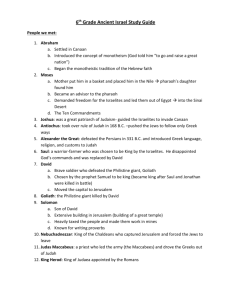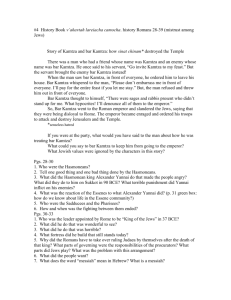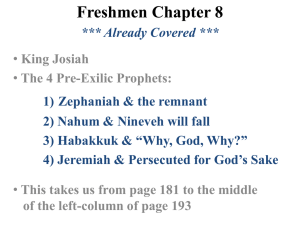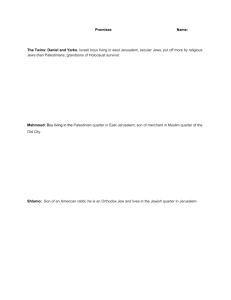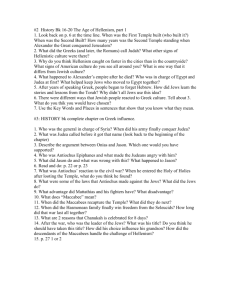Document
advertisement
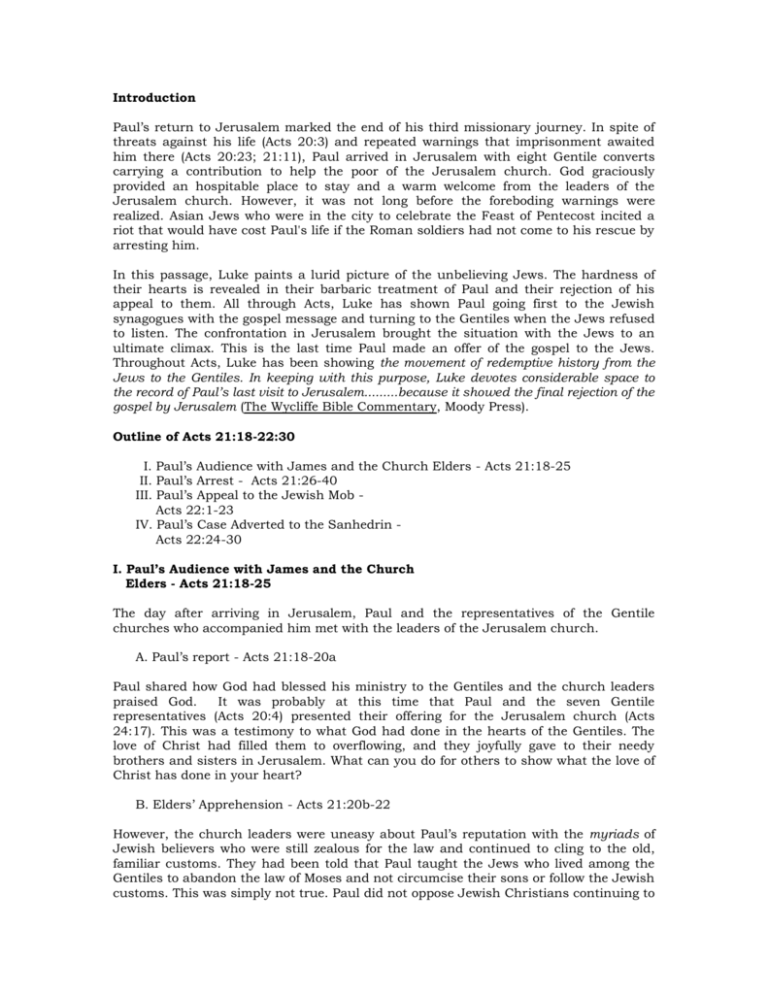
Introduction Paul’s return to Jerusalem marked the end of his third missionary journey. In spite of threats against his life (Acts 20:3) and repeated warnings that imprisonment awaited him there (Acts 20:23; 21:11), Paul arrived in Jerusalem with eight Gentile converts carrying a contribution to help the poor of the Jerusalem church. God graciously provided an hospitable place to stay and a warm welcome from the leaders of the Jerusalem church. However, it was not long before the foreboding warnings were realized. Asian Jews who were in the city to celebrate the Feast of Pentecost incited a riot that would have cost Paul's life if the Roman soldiers had not come to his rescue by arresting him. In this passage, Luke paints a lurid picture of the unbelieving Jews. The hardness of their hearts is revealed in their barbaric treatment of Paul and their rejection of his appeal to them. All through Acts, Luke has shown Paul going first to the Jewish synagogues with the gospel message and turning to the Gentiles when the Jews refused to listen. The confrontation in Jerusalem brought the situation with the Jews to an ultimate climax. This is the last time Paul made an offer of the gospel to the Jews. Throughout Acts, Luke has been showing the movement of redemptive history from the Jews to the Gentiles. In keeping with this purpose, Luke devotes considerable space to the record of Paul’s last visit to Jerusalem.........because it showed the final rejection of the gospel by Jerusalem (The Wycliffe Bible Commentary, Moody Press). Outline of Acts 21:18-22:30 I. Paul’s Audience with James and the Church Elders - Acts 21:18-25 II. Paul’s Arrest - Acts 21:26-40 III. Paul’s Appeal to the Jewish Mob Acts 22:1-23 IV. Paul’s Case Adverted to the Sanhedrin Acts 22:24-30 I. Paul’s Audience with James and the Church Elders - Acts 21:18-25 The day after arriving in Jerusalem, Paul and the representatives of the Gentile churches who accompanied him met with the leaders of the Jerusalem church. A. Paul’s report - Acts 21:18-20a Paul shared how God had blessed his ministry to the Gentiles and the church leaders praised God. It was probably at this time that Paul and the seven Gentile representatives (Acts 20:4) presented their offering for the Jerusalem church (Acts 24:17). This was a testimony to what God had done in the hearts of the Gentiles. The love of Christ had filled them to overflowing, and they joyfully gave to their needy brothers and sisters in Jerusalem. What can you do for others to show what the love of Christ has done in your heart? B. Elders’ Apprehension - Acts 21:20b-22 However, the church leaders were uneasy about Paul’s reputation with the myriads of Jewish believers who were still zealous for the law and continued to cling to the old, familiar customs. They had been told that Paul taught the Jews who lived among the Gentiles to abandon the law of Moses and not circumcise their sons or follow the Jewish customs. This was simply not true. Paul did not oppose Jewish Christians continuing to follow their ancestral customs. His message of salvation by faith in Christ and not by works made it clear that observing the ceremonial law was totally unnecessary (Galatians 5:2-6), but it was never prohibited. The zealous Jews had to be shown the truth, so the elders devised an interesting plan to help in their defense of Paul. C. Elders’ plan for Paul - Acts 21:22-25 If Paul showed submission to the law, it would prove to the legalistic Jewish Christians that he was not against the law, that he accepted the Jewish customs, and that he was a law-abiding Jew. The elders wanted Paul to join in the purification rites and pay the expenses (for the required sacrifices) of four men who had taken a Nazarite vow (Numbers 6:1-21). It was common practice for devout Jews to pay the expenses related to a vow for those who could not afford it. If Paul went along with the plan, he would show that the accusations against him were untrue and that he supported those who loved the law. The elders wanted to make sure that Paul understood that their plan did not conflict with the earlier decision of the Jerusalem Council (Acts 15). They repeated the standing decision of that council (21:25) to confirm that his actions would in no way affect the Gentiles whose freedom from the law had been established. II. Paul’s Arrest - Acts 21:26-40 Paul followed the advice of the elders, confirming one of the basic principles of his ministry as stated in 1 Corinthians 9:20, To the Jews I became as a Jew, that I might win Jews; to those who are under the law, as under the law, that I might win those who are under the law. Paul did what was necessary to win souls to Christ. Some argue that Paul was being hypocritical in what he did, but to him, the Jewish religious customs were not a major issue. The Jewish Christians were free to keep the ceremonial law if they chose to do so. But the law was not to be imposed on Gentile believers as a basis for salvation. Any believer was free to keep the ceremonial law or not. It was a matter of choice as long as it was not considered a requirement for salvation. As believers we are free in Christ — free to fully follow His will for us. A. Asian Jews incite a riot - Acts 21:26-31a Paul was in the temple fulfilling the commitment he had made to the four men who had taken the vow. Because the Feast of Pentecost was being celebrated at this time, there were many Jews in the city from all the Roman provinces. Some unbelieving Jews from Asia spotted Paul and instigated a riot. 1. Accusations against Paul - 21:28-29 These Asian Jews stirred up the crowd by yelling accusations that Paul was against the Jewish people, against the law, and against the holy temple. They claimed he had even taken a Greek into the temple because they had seen Paul in the city with Trophimus (Acts 20:4), a Gentile from Ephesus. When they saw Paul in the temple they immediately jumped to the conclusion that he had taken Trophimus into the temple court. To the Jews, a Gentile’s presence defiled the temple. Gentiles were only allowed in the outer “court of the Gentiles” which was separated from the inner “court of Israel” by a low stone wall with doors. There were inscriptions on the outer walls which warned Gentiles not to enter on penalty of death. 2. All the city was disturbed - 21:30-31a The loud accusations aroused the crowd who rushed at Paul, took hold of him, dragged him out of the temple, and began beating him, seeking to kill him. Had they just been waiting for an opportunity to attack Paul? They certainly seemed eager to do so. The doors leading into the “court of Israel" were quickly shut to keep Gentiles or disorderly conduct from defiling the temple. B. Roman officers rescue Paul - Acts 21:31b-40 Paul would have been killed if the commander of the Roman garrison had not acted promptly. The garrison was the Antonia Fortress located at the northwest corner of the temple area. Roman troops were stationed there at all times and the number was increased during Jewish feast days. Two flights of stairs leading from the outer court of the temple to the fortress made the temple area easily accessible for the Roman soldiers. The commander (a leader of a thousand soldiers) was Claudius Lysias (Acts 23:26). Centurions were officers with one hundred men under their command. Since Luke uses the plural, centurions, there must have been at least two, meaning that a minimum of two hundred men were sent to quiet the riot. 1. Immediate action by the commander - 21:31b-32 When the news of the riot reached the commander of the garrison, he immediately took troops into the temple area. When the Jews saw the Roman troops, they stopped beating Paul. 2. Arrest of Paul - 21:33 Paul was taken into protective custody and chained to two soldiers. The commander tried to question Paul, but the mob shouted so loudly it was impossible for Paul to give his defense. 3. Confusion of the crowd - 21:34-36 It was a mob scene of total confusion. Some in the crowd were shouting one thing and some another so that the commander could not determine the truth. He decided to take Paul to the barracks (in the fortress) where he could question him privately. The troops led Paul to the stairs leading up to the Antonia Fortress. By that time, the mob was so violent the soldiers were forced to carry Paul away. The mob followed, yelling away with him! Just as the crowds of Jerusalem had called for the death of their Messiah twentyseven years earlier (John 19:15), they now called for the death of Paul. 4. Request by Paul -21:37-40 By the time he reached the top of the steps, Paul must have presented a sorry figure bruised, battered, begrimed, and disheveled. But , as so frequently in Acts, he is quickly in command of the situation (The Book of the Acts, F.F. Bruce). Paul addressed the Roman commander in the Greek language. This came as a surprise to him. He had thought that Paul was an Egyptian insurrection leader who had led a band of assassins several years earlier. Paul assured the commander that he was not the Egyptian. He was a Jew (and therefore had a right to be in the temple) and a citizen of the reputable city of Tarsus. He earnestly desired to speak to the people. The commander gave Paul permission to speak. Paul stood at the top of the fortress stairs and motioned to the people with his hand until they became quiet. He then began to speak to them in Hebrew (Aramaic), the language of the Palestinian Jews. By speaking in the language of the Jerusalem Jews, Paul attempted to establish a common bond with them. III. Paul’s Appeal to the Mob - Acts 22:1-23 Paul defended himself against the false accusations that he was against the Jews, the law, and the temple (Acts 21:28). He explained that he was a Jew by birth, had been trained in the law, and was zealous for the law. His conversion to Christianity had come by divine revelation and confirmed by revelation to the devout Jew, Ananias. Even after his conversion, Paul continued to honor the temple and worship there. That is where he had received the divine command to go and preach to the Gentiles. A. Paul's commitment to the law - Acts 22:1-5 Paul explained that he was a Jew, as was his audience. He had been born in the Cicilian city of Tarsus, but brought up in Jerusalem. He had been taught strictly according to the law by Gamaliel, the most highly respected rabbi of his time (See Acts 5:34.). He was a zealous defender of the law, just as his listeners were. In fact, he was even more zealous than they because he went to extremes in persecuting the Way (Christians), arresting and putting to death both men and women. The high priest and the members of the Sanhedrin could confirm what he said because they had given him letters authorizing him to arrest Jewish believers in Damascus and deliver them to Jerusalem. B. Paul's testimony of his conversion - Acts 22:6-16 Paul related his conversion experience on the road to Damascus as Luke had described in Acts 9. 1. The blinding light and the voice - 22:6-8 On the way to Damascus,at mid-day, a bright light from heaven shone all around him and a voice asked, Saul, Saul, why are you persecuting me? When Paul asked who was speaking, the voice answered, I am Jesus of Nazareth, whom you are persecuting. It was really not the Christians Paul was persecuting but Jesus of Nazareth. 2. The witnesses to the light - 22:9 Those who were with Paul also saw the light but did not hear the voice speaking to him. Since Luke’s account in 9:7 says that they heard the voice, it is probable that they did hear some sound, but not as a voice with discernible words. 3. The Lord’s instructions to Paul - 22:10-11 Paul asked Jesus what he should do and was told to go to Damascus and wait for further instructions. Paul obeyed but had to be led by the hand because the bright light had blinded his eyes. 4. Paul’s conversion is confirmed by Ananias - 22:12-16 Ananias, a devout man who observed the law and had a good reputation among the Jews, visited Paul in Damascus. Paul stressed that Ananias was a strict Jew. He welcomed Paul into the fellowship of believers, calling him brother, and restored his sight. The fact that Ananias restored Paul’s sight was a confirmation that the message he brought was from the Lord. Ananias delivered God’s commission for Paul. God had chosen Paul to know His will. Having seen Christ (the Just One, also in Acts 7:52) and heard His voice, Paul was to be a witness to all men of what he had seen and heard. He was to show his obedience by being baptized, an outward sign of the inward change which had taken place in Paul’s heart. NOTE: Paul did not specifically say that his conversion involved actually seeing the risen Christ, however the following Scripture passages confirm that this did occur: Acts 26:16; 1 Corinthians 9:1; 15:8, Galatians 1:12. C. Paul’s commission came by God’s direct command - Acts 22:17-21 As a Christian, Paul continued to go to the temple when he was in Jerusalem. On one occasion he had gone there to pray. He had fallen into a trance and had a vision of the Lord instructing him to get out of Jerusalem because the Jews would not accept his testimony concerning Him. Paul explained how he had resisted the command to leave. He had experienced a radical change in his life, and surely the Jews would see that it had to be by the power of God. He had been the infamous persecutor who imprisoned and beat believers. He was an approving witness of Stephen’s martyrdom. But now he preached the same gospel which Stephen had died for. Surely the Jews would see the dramatic change in his life had to be by the power of God. Surely they would listen to his message. The Lord spoke to Paul, confirming his command to leave Jerusalem and the commission to go and preach the gospel. Paul related the Lord's exact words to his audience: Depart, for I will send you far from here to the Gentiles. D. The mob responded with rage - Acts 22:22-23 Paul’s mention of his ministry to the Gentiles ignited the rage of the Jews. If he had not used the word Gentile, Paul might have been set free, but he could not keep from using it because his commission from God and the burden of his heart was to reach the Gentiles. The fatal word which Paul had avoided up to this point fell like a spark on the inflammable mass of the mob’s fanaticism (Word Studies in the New Testament, Marvin R. Vincent). They shouted for Paul’s death. They tore their clothes and threw dust in the air to express their fury and horror at the thought of God sending a Jew on a mission to the Gentiles. III. Paul’s Case Adverted to the Sanhedrin - Acts 22:24-30 With the mob again out of control, the Roman commander decided to take Paul into the barracks for interrogation. A. Roman commander orders Paul to be scourged - Acts 22:24-29 The commander sought a confession from Paul by having him scourged. The Roman scourge was a cruel instrument of torture, a short, leather whip embedded with pieces of metal or bone and attached to a sturdy wooden handle. Scourging could result in permanent crippling and even death. Paul had been beaten with rods three times and received the Jewish “thirty-nine lashes” five times (2 Corinthians 11:24-25), but neither one of these delivered the devastating blows of a Roman scourge. 1. Paul reveals his Roman citizenship - 22:25-27 Roman citizenship was a precious possession. One of the benefits was exemption from being chained or scourged. As Paul was being bound in preparation for the scourging, questioned the centurion, Is it lawful for you to scourge a man who is a Roman, and uncondemned? The centurion knew the answer well and responded immediately by informing the commander that Paul was a Roman citizen. The commander went directly to Paul and asked him if he were a Roman. Paul answered, Yes. 2. Roman soldiers react - 22:28-29 The commander told Paul that he had paid a large sum of money to obtain Roman citizenship, perhaps implying that the privilege must have become cheap of late if such a sorry-looking figure as Paul could claim it (The Book of the Acts, F.F. Bruce). He must have been dumbfounded when Paul quietly replied that he had been born a citizen. Upon hearing this, the whole atmosphere of the barracks changed. The soldiers drew back and the commander was afraid. He had violated Roman law by illegally binding Paul and ordering him to be scourged. Compare the reaction of the soldiers to that of the magistrates in Acts 16:35-39 when they discovered that Paul and Silas were Roman citizens. B. Roman commander takes Paul before the Sanhedrin - 22:30 The commander still wanted to get to the root of the problem, so he kept Paul in protective custody. It appeared that the accusations against Paul were of a religious nature, so he decided to order a meeting of the Sanhedrin. He would let the Jewish council determine if there were grounds for legal proceedings against Paul. The very next day the chief priests and all the council convened. Paul was released and taken before them. Applications 1. In a very difficult and demeaning situation, Paul remained calm and dignified. He was respectful and courteous even when he was treated unjustly. He represented His Lord and savior nobly and faultlessly, following in His steps. For you have been called for this purpose, since Christ also suffered for you, leaving you an example for you to follow in His steps, WHO COMMITTED NO SIN, NOR WAS ANY DECEIT FOUND IN HIS MOUTH; and while being reviled, He did not revile in return; while suffering, He uttered no threats, but kept entrusting Himself to Him who judges righteously (1 Peter 2:21-23, NASB) How do you react under pressure or when you are unjustly treated? How can you be more like Christ and like Paul? 2. The Jewish mob which beat Paul and called for his death were bigots. They looked down their noses at the Gentiles and despised their inferiority. They could not stand the thought that God might show mercy and favor to the Gentiles. Do you feel a superiority because of your racial, educational, socioeconomic or ethnic background? Are those feelings ever demonstrated in your words or actions? Is your church divided along any of these lines? What can you do to show acceptance and love toward those who are different than you?

